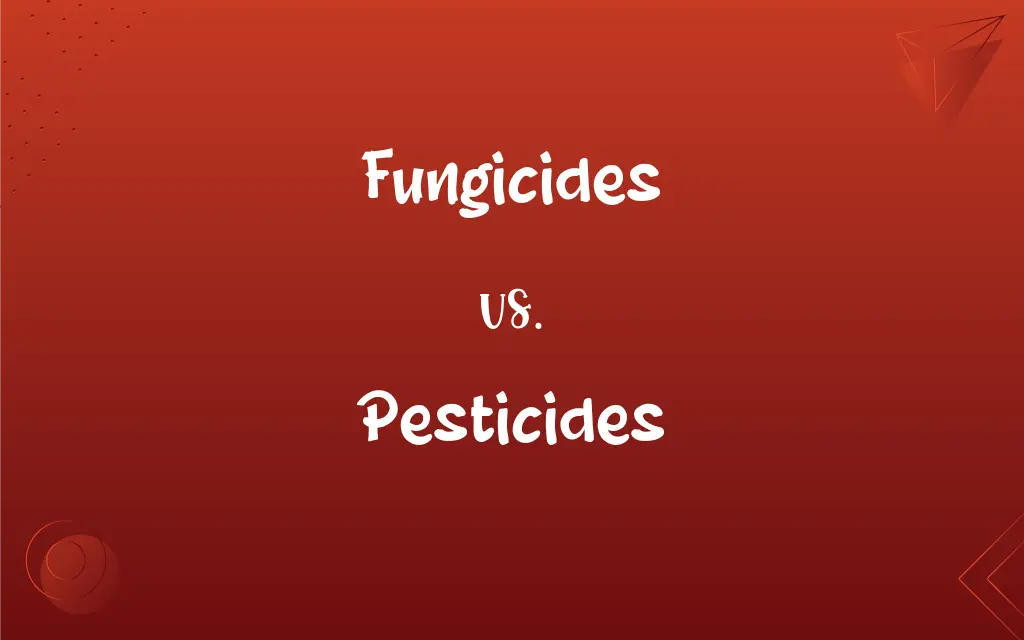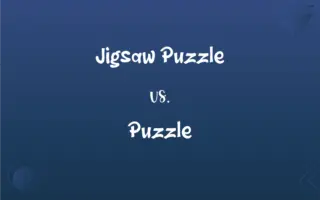Fungicides vs. Pesticides: What's the Difference?
Edited by Aimie Carlson || By Harlon Moss || Published on February 15, 2024
Fungicides are chemicals specifically used to kill or inhibit fungi and their spores, while pesticides are a broader category of chemicals used to kill various pests, including insects, weeds, and fungi.

Key Differences
Fungicides are specialized chemical compounds targeting fungi and their spores, often used in agriculture and gardening. Pesticides, a broader term, encompass a range of substances including herbicides, insecticides, and fungicides, used to control various pests.
The primary function of fungicides is to prevent or cure fungal infections in plants, important for crop protection. Pesticides, however, serve a wider purpose, controlling a variety of pests that can harm crops, animals, or human health.
Fungicides often work by disrupting the cellular processes of fungi, a distinct biological kingdom. In contrast, pesticides might target specific aspects of the biology of insects, weeds, or other pests, depending on their type.
The use of fungicides is crucial in preventing losses in agriculture due to fungal diseases. Pesticides, given their broader scope, are essential in integrated pest management, contributing to pest control in various environments.
Both fungicides and pesticides face challenges regarding environmental impact and the development of resistance in their targets, necessitating careful and responsible use.
ADVERTISEMENT
Comparison Chart
Target
Specifically fungi and their spores
A broad range of pests including insects, weeds, and fungi
Primary Use
Prevent and cure fungal infections
Control and eliminate various pests
Application
Mainly in agriculture and gardening
In agriculture, public health, and homes
Mechanism
Disrupt fungi’s cellular processes
Varying mechanisms depending on pest type
Environmental Impact
Can affect non-target organisms
Broader ecological implications
ADVERTISEMENT
Fungicides and Pesticides Definitions
Fungicides
Fungicides can be organic or synthetic in nature.
She prefers using organic fungicides in her home garden.
Pesticides
Pesticides include herbicides, insecticides, and fungicides.
His farming practices involve the judicious use of various pesticides.
Fungicides
Fungicides are chemicals that inhibit or eradicate fungal growth.
The farmer applied fungicides to combat the mildew on his grapes.
Pesticides
Pesticides are substances used to kill or deter pests.
The gardener sprayed pesticides to eliminate aphids.
Fungicides
Fungicides are used in both agriculture and horticulture.
Fungicides are essential for controlling rust in wheat crops.
Pesticides
Pesticides can be chemical or natural in origin.
Neem oil is a natural pesticide used against mites.
Fungicides
Fungicides can be contact, translaminar, or systemic.
Systemic fungicides are absorbed by the plant for internal protection.
Pesticides
Pesticides are used in agriculture to enhance crop yield.
Crop yields improved significantly after pesticide application.
Fungicides
Some fungicides are used in medicine to treat fungal infections.
Antifungal creams are topical fungicides.
Pesticides
Some pesticides are designed for specific pests.
Bt toxin is a pesticide specific to certain caterpillars.
Fungicides
A substance that destroys or inhibits the growth of fungi.
Pesticides
A substance or agent used to kill pests, such as unwanted or harmful insects, rodents, or weeds.
Fungicides
Plural of fungicide
Pesticides
Plural of pesticide
FAQs
Can pesticides harm beneficial insects?
Yes, some pesticides can harm beneficial insects like bees.
Do fungicides work on all fungi?
Fungicides are effective against many fungi, but not all.
Are fungicides safe for all plants?
Fungicides are generally safe, but sensitivity varies among plants.
What do pesticides do?
Pesticides control a wide range of pests, including insects, weeds, and fungi.
What are fungicides mainly used for?
Fungicides are used to control fungal diseases in plants.
Are all pesticides chemical?
No, there are natural pesticides as well as synthetic ones.
Do fungicides have environmental impacts?
Yes, fungicides can impact non-target organisms and environments.
How long do fungicides remain effective?
The duration of effectiveness depends on the fungicide type and conditions.
How do pesticides affect human health?
Pesticides can pose risks if not used properly, including potential toxicity.
Do pesticides need to be reapplied?
Yes, reapplication is often necessary for continued effectiveness.
Can I use pesticides for indoor plants?
Yes, but ensure the pesticide is suitable for indoor use.
Are fungicides the same as pesticides?
Fungicides are a type of pesticide specifically for fungi.
How are fungicides applied?
Fungicides can be sprayed, dusted, or used as a soil treatment.
Can pesticides contaminate water?
Yes, improper use of pesticides can lead to water contamination.
Are pesticides used in home gardens?
Yes, pesticides are often used in home gardens for pest control.
Are all pesticides harmful to the environment?
The environmental impact of pesticides varies based on type and usage.
Can fungicides be used organically?
Yes, there are organic fungicides available.
Are fungicides effective immediately?
The effectiveness of fungicides varies; some work quickly, others over time.
Can fungicides cause resistance in fungi?
Yes, overuse of fungicides can lead to resistance in fungi.
How do I choose the right pesticide?
Choose based on the specific pest problem and environmental considerations.
About Author
Written by
Harlon MossHarlon is a seasoned quality moderator and accomplished content writer for Difference Wiki. An alumnus of the prestigious University of California, he earned his degree in Computer Science. Leveraging his academic background, Harlon brings a meticulous and informed perspective to his work, ensuring content accuracy and excellence.
Edited by
Aimie CarlsonAimie Carlson, holding a master's degree in English literature, is a fervent English language enthusiast. She lends her writing talents to Difference Wiki, a prominent website that specializes in comparisons, offering readers insightful analyses that both captivate and inform.







































































